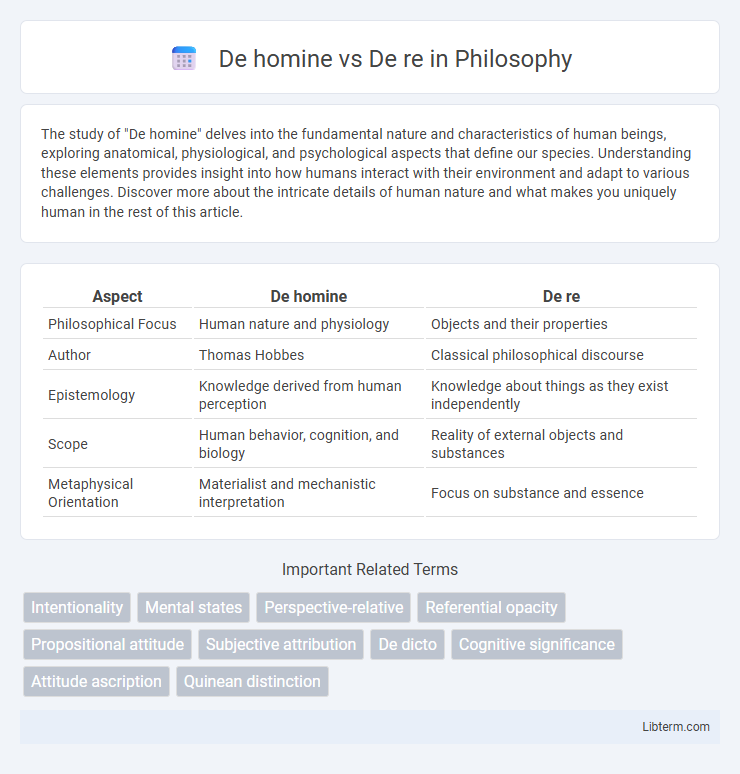The study of "De homine" delves into the fundamental nature and characteristics of human beings, exploring anatomical, physiological, and psychological aspects that define our species. Understanding these elements provides insight into how humans interact with their environment and adapt to various challenges. Discover more about the intricate details of human nature and what makes you uniquely human in the rest of this article.
Table of Comparison
| Aspect | De homine | De re |
|---|---|---|
| Philosophical Focus | Human nature and physiology | Objects and their properties |
| Author | Thomas Hobbes | Classical philosophical discourse |
| Epistemology | Knowledge derived from human perception | Knowledge about things as they exist independently |
| Scope | Human behavior, cognition, and biology | Reality of external objects and substances |
| Metaphysical Orientation | Materialist and mechanistic interpretation | Focus on substance and essence |
Introduction to De Homine and De Re
De Homine and De Re represent fundamental distinctions in philosophy of language and metaphysics, addressing how terms relate to subjects. De Homine focuses on concepts relating to the person or human entity, emphasizing attributes and qualities intrinsic to individuals. De Re concerns objects or things themselves, highlighting reference to external entities regardless of human perspective.
Historical Context of the Concepts
The concepts of *De homine* and *De re* originate from medieval scholastic philosophy, particularly in the works of philosophers like John Buridan and William of Ockham. *De homine* refers to propositions about things as they appear to human minds, emphasizing subjective interpretation, while *De re* concerns propositions about things in themselves, focusing on objective reality. This distinction played a crucial role in the development of epistemology and semantics during the Middle Ages, influencing later debates on reference and truth conditions in analytic philosophy.
Philosophical Definitions: De Homine vs. De Re
Philosophical definitions distinguish "De homine" as concerning properties or predicates about a person, emphasizing subjective or intentional aspects, whereas "De re" pertains to properties attributed directly to the thing itself, independent of perception. "De homine" explores how mental states or linguistic expressions refer to individuals, while "De re" addresses objective features that exist irrespective of observers. This distinction is pivotal in metaphysics and philosophy of language for understanding reference, modality, and the nature of predication.
Key Differences Between De Homine and De Re
De homine centers on the study of human beings, exploring physical, psychological, and social aspects of people as individuals. De re focuses on objects, properties, or things themselves, emphasizing the intrinsic attributes and existence independent of perception. The key difference lies in De homine addressing human-centric phenomena, while De re examines the essence and reality of external entities.
Importance in Linguistic Analysis
De homine examines language through human cognitive and psychological processes, emphasizing the speaker's intention and mental representations, which is crucial for understanding pragmatics and meaning in context. De re focuses on the direct reference to objects or entities in the world, essential for semantic accuracy and referential clarity in linguistic analysis. Combining both perspectives enhances interpretation of meaning, reference, and the interplay between language and thought in discourse.
Applications in Logic and Semantics
De homine and De re distinctions play a crucial role in formal semantics and modal logic, particularly in theories of reference and propositional attitudes. De re interpretations involve reference to objects themselves, enabling precise modeling of belief reports and intensional contexts, while de homine interpretations focus on attributions of properties or predicates to individuals, affecting variable binding and quantification. These distinctions optimize logical formalisms for natural language understanding, impacting the development of semantic parsing algorithms and knowledge representation systems.
De Homine and De Re in Modal Logic
De Homine and De Re modalities represent distinct approaches in modal logic, where De Homine modalities address properties or necessities ascribed to individuals or agents, emphasizing subjective perspectives and intentions. De Re modalities focus on the actual objects or things themselves, capturing objective properties and necessities irrespective of agent beliefs or knowledge. This distinction is crucial for formal semantics and philosophical analyses of modality, influencing interpretations in epistemic, deontic, and metaphysical contexts.
Examples Illustrating Each Concept
De homine, exemplified by Descartes' *Discourse on the Method*, explores knowledge derived from human cognition and sensory experience. De re is illustrated by Aristotle's *Metaphysics*, emphasizing objects' intrinsic properties independent of perception. Analyzing these texts highlights human understanding from subjective awareness versus objective reality perspectives.
Debates and Criticisms within Philosophy
Debates between De homine and De re center on the nature of reference and the limits of meaning in philosophy of language. Critics argue De homine emphasizes intentions and mental states, which may render meaning too subjective and inaccessible, while De re focuses on direct reference to objects, risking oversimplification of linguistic context. The philosophical tension questions whether understanding language hinges more on internal cognitive states or external reality, influencing theories of meaning, knowledge, and communication.
Conclusion: Contemporary Relevance
De homine and De re debates remain pivotal in contemporary philosophy and cognitive science, shaping discussions on reference, meaning, and knowledge attribution in language. Modern semantic theory draws from De re's emphasis on objects themselves, impacting fields like artificial intelligence and linguistics by enhancing natural language understanding. De homine's perspective, focusing on the speaker's cognitive state, informs studies in pragmatics and epistemology, demonstrating ongoing influence in analyzing human communication and belief systems.
De homine Infographic

 libterm.com
libterm.com